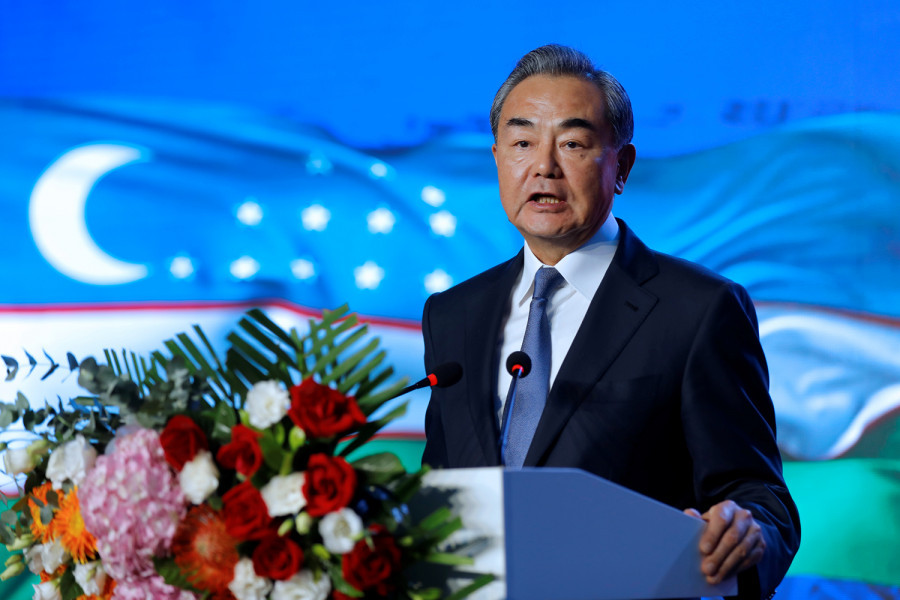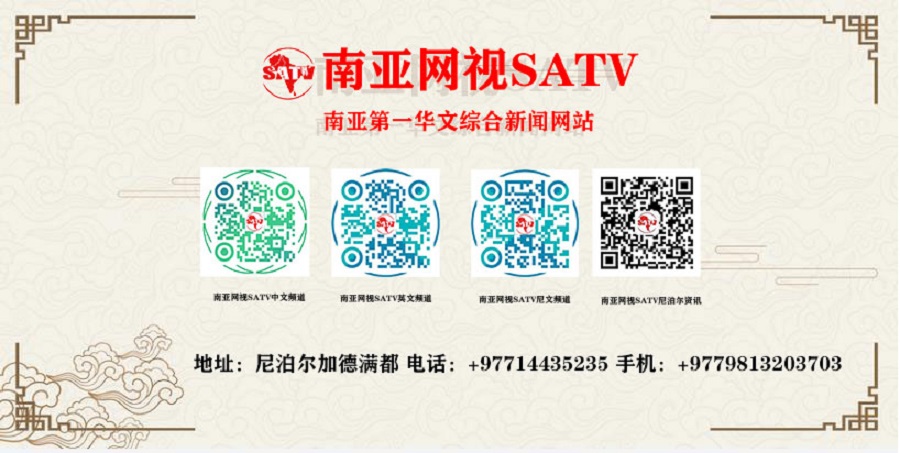
Chinese Foreign Minister and State Councilor Wang Yi. Reuters
Chinese Foreign Minister and State Councillor Wang Yi is paying an official visit to Nepal at the end of this month, and officials familiar with the matter say both sides are looking for a conducive date most likely March 26-27.
Multiple sources at the Ministry of Foreign Affairs and those close to the political leadership told the Post that along with Wang, Song Tao, head of the International Liaison Department of the Chinese Communist Party, a vice foreign minister and a delegation from various departments of the Chinese government will be visiting Nepal.
Wang will be the senior most foreign dignitaries to visit Nepal after Prime Minister Sher Bahadur Deuba assumed office on July 13.
At least three officials at the Ministry of Foreign Affairs told the Post that during a telephonic conversation between Foreign Minister Narayan Khadka and Wang in October last year, the Chinese foreign minister had invited Khadka to visit China.
But there was Covid-19 and there were no flights to China. So Khadka couldn’t visit Beijing.
This time, according to the officials, the Chinese side expressed their intent to send a delegation to Nepal as Beijing is conducting high profile visits to South Asia and Wang’s trip to Kathmandu was included in the plan.
The planned visit from the northern neighbour has generated interest in Nepal as it is taking place on the heels of the ratification of the $500 million Millennium Challenge Corporation compact, about which Beijing has openly expressed its strong reservations.
Government officials and political party leaders as well as China-watchers in Kathmandu say the Chinese appear to be interested in assessing the situation first hand after the passage of the US compact. Beijing also wants to gauge if the American grant’s implementation could affect its security and strategic concerns and it also sees an opportunity to push its Belt and Road Initiative which Nepal signed up to in 2017, according to them.
“We have a new government. And we have seen some concerns from Beijing about our Parliament’s decision to ratify the US compact,” said former foreign minister Prakash Sharan Mahat, who is also the spokesperson for the ruling Nepali Congress party. “Chinese apprehensions about the MCC compact could figure during talks.”
In the lead up to the MCC compact’s ratification, Beijing spoke twice, once warning Washington against “coercive diplomacy” in Nepal and, again, making a taunt at Americans, questioning how a gift can be delivered with an ultimatum and whether that was a gift or Pandora’s box.
After the passage of the MCC pact, Beijing said it noted the development.
But in recent days, Beijing’s two mouthpieces—China Daily and Global Times—produced as many strongly-worded editorials, saying that benefits of the Nepal compact come with risks and the MCC pact with Nepal threatens peace and development in South Asia.
Mahat, however, said there’s nothing for China to be concerned about with regard to the MCC compact.
“Actually the visit will provide a good opportunity for us to dispel the notion that MCC is against China,” Mahat told the Post. “We want to have good relations with all our friendly countries… be it India, China, the US and others. And there is nothing for China to be worried about regarding the MCC.”
Some China experts believe Beijing could be looking to aggressively push some projects under the BRI, which it views as a development vehicle that extends cooperation on the basis of mutual respect and equality.
Despite Nepal and China signing the Framework Agreement on the BRI in May 2017, four months before Nepal signed the MCC compact with the United States, there has not been any desirable progress.
During his visit to Beijing in 2018, then prime minister KP Sharma Oli had submitted a list of 35 projects to be executed under the BRI. Later, the Chinese side requested Nepal to cut down the number of projects to single digit. The Ministry of Finance then slashed the number to nine. But not a single project has reached the state of negotiations. Nepal and China only recently started working on a project implementation plan that will ensure project selection under the different clusters identified by the framework agreement.
“Both sides are jointly working on the text of the project implementation plan and that could be ready and signed anytime,” said a senior Foreign Ministry official.
Rupak Sapkota, who holds a PhD on international relations from Renmin University, Beijing, said due to the Covid-19 pandemic and China's own zero-Covid policy and internal political situation, not a single project under the BRI could move forward.
“Projects under the BRI could be high on agenda during Wang’s visit,” Sapkota told the Post. “As Nepal has ratified the MCC, Beijing too wants to see at least two projects executed under the BRI.”
According to Sapkota, within China too, opinions are emerging that Beijing should respect the sovereign decision of Nepal.
“The Chinese, however, are cautious about regional stability and they want to ensure that regional peace should not be compromised due to the execution of the MCC,” said Sapkota. “It appears that China wants to see greater transparency and accountability while executing projects under the MCC.”
The $500 million grant Nepal will receive from the US will be used in building electricity transmission lines and improving roads.
Song, the head of the International Liaison Department of the Chinese Communist Party, who is also visiting Nepal along with Wang, had held a series of video conversations with Nepali communist leaders including Maoist Centre chair Pushpa Kamal Dahal and CPN-UML chair KP Sharma Oli days before the MCC compact was ratified in Nepal.
Sundar Nath Bhattarai, chairman of the Nepal China Study Centre in Kathmandu, said that the visit by such a high-level Chinese delegation means Beijing wants to explore possible impacts of the MCC compact and extract a pledge from Kathmandu that China’s core security interests will not be compromised.
“Since several security, military and strategic concepts like Indo-Pacific and QUAD are emerging in the region, the Chinese are concerned,” Bhattarai told the Post. “Amid all this, we have ratified the American compact. Beijing wants to assess if it in any way could hamper Nepal-China ties.”
The MCC compact was—and still is—understood by many as part of Washington’s Indo-Pacific Strategy. Even some American officials had during their Nepal visit made statements, insinuating that the compact is part of the strategy, which Beijing believes is an American tool against China and its BRI.
“Kathmandu has ratified the American grant at a time when the BRI has failed to take off. We have a shortfall of funds to finance our development projects, so China could be a good source country since it is our close neighbour,” said Bhattarai. “There are several micro and macro issues which, I believe, will be discussed during the Chinese delegation’s visit.”
Officials said various agreements and understandings were signed between Nepal and China during Chinese President Xi Jinping’s visit to Nepal in October 2019 and Oli’s visit to China in June 2018. But they could not be followed up due to Covid, according to them.
During his visit to Nepal, Xi had announced Rs56 billion aid to Nepal for next two years but two sides have yet to begin negotiations on how to utilise the Chinese grant.
“We had written to the Foreign Ministry about the grant assistance announced during the Chinese president’s visit and its status some six months ago. But we have not received any official communication from the Foreign Ministry,” said a Finance Ministry requesting anonymity. “Over one dozen pacts and understandings were signed, and most of them remain unimplemented.”
Officials said the date of the Chinese visit will be finalised after Foreign Minister Narayan Khadka returns from Turkey and Foreign Secretary Bharat Raj Poudyal returns from South Africa.
On Tuesday, before flying to Turkey to participate in the Antalya Diplomacy Forum being held on 11-13 March, Khadka told the Post that he could share details about the visit from China after his return.
“Things are still in a preliminary stage,” said Khadka. “We will finalise the date and begin preparations after I return.”
Khadka is scheduled to return on March 14.













